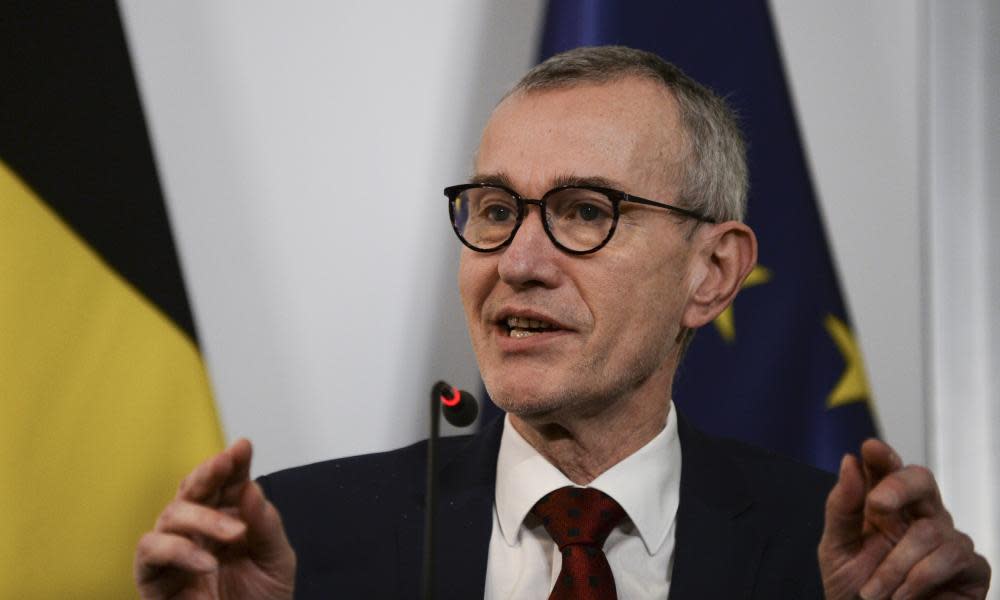Belgium considers U-turn on Oxford Covid vaccine for over-55s

People over the age of 55 in Belgium could be given the Oxford/AstraZeneca coronavirus vaccine, as the government seeks to “reset” its heavily criticised vaccination programme.
Belgium joined Germany, France, Poland and Italy last month in only giving the vaccine to younger groups due to a comparative lack of data on its efficacy in the older age ranges in the Oxford/AstraZeneca clinical trials.
But images of empty vaccination centres and reports of untouched stockpiles of doses lying in fridges has led to an outcry over the slow progress in administering vaccines, with the country also suffering a rise in infections.
Hospital admissions on Sunday were up 44% on last week, according to provisional figures. Just 6.96% of the Belgian population has received a jab, compared with 30.14% in the UK. The average proportion given a vaccine across the EU’s 27 member states is 7.26%.
Frank Vandenbroucke, the Belgian federal minister of health, said the government would take advice on Wednesday from its chief scientists and regional leaders “on the strategy and on the operational problems”.
“I really want a reset of the campaign,” he said. “There are hiccups that absolutely must be resolved and which are not acceptable. There are delays in the process which are not acceptable.”
The government is considering rethinking its previous policy that the Oxford/AstraZeneca vaccine should only be give to people under the age of 55.
Watch: EU to propose vaccine certificates
A recent “real world” study in Scotland showed a very high level of effectiveness in the Pfizer/BioNTech and Oxford/AstraZeneca vaccines among older people. Among the over-80s, there was an overall 81% reduction in the numbers admitted to hospital, according to the study by Scottish universities and Public Health Scotland. Although the study was not set up to look at any differences between the two vaccines, it suggested that both were working well, said the researchers.
Vandenbroucke said: “If we can administer AstraZeneca to everyone, our vaccination campaign can be simpler and more direct.
“If we can further space the first dose of Pfizer and the second dose, this will create a significant accelerator effect which will be very welcome in the context we are currently living, where there is perhaps the danger of a third wave.”
Medical regulators in Germany are also under increasing pressure to rethink its policy of only giving the AstraZeneca vaccine to people aged over 65, so as to avoid the Oxford-developed product going to waste.
On Monday, the premiers of the German states of Bavaria and Saxony presented a plan for the AstraZeneca jab to be administered to anyone aged 18 or above in hotspots on the border with the Czech Republic.
“We have to up the tempo,” the Bavarian leader, Markus Söder, said in a press conference.
The AstraZeneca vaccine is currently being administered to different priority groups in Germany than the BioNTech/Pfizer and Moderna jabs, after the country’s vaccine authority only permitted the Oxford jab to be used on those under the age of 65.
The effort of finding the right people in the right age group has hampered the rollout, with Germany’s health ministry stating it has so far used only 15% of the AstraZeneca stock.
“It’s typically German and stubbornly bureaucratic: everything in the right order!” commented the left-leaning broadsheet Taz. “But this principle is currently impeding a faster vaccination of the population.”
The head of the south-western state of Baden Württemberg, Winfried Kretschmann, backed scrapping priority groups for the Oxford vaccine over the weekend, telling Welt am Sonntag newspaper: “The prioritisation is a deficient management system and should be abolished quickly.”
“We cannot afford the vaccine sitting around and not being used because some of those entitled reject it,” Kretschmann added.
The head of Germany’s standing commission on vaccination hinted on Friday that his body could update its advice on the use of the AstraZeneca vaccine “very soon”.
Last week, the EU’s 27 heads of state and government committed to speeding up the vaccine rollout across Europe.
The European commission president, Ursula von der Leyen, said on Monday she would present a proposal in March on creating an EU-wide digital vaccination passport to facilitate travel within the bloc.
“As for the question of what the digital green passport could look like: we will submit a legislative proposal in March,” she said in a video conference with German conservative lawmakers. She later tweeted: “The aim is to provide: proof that a person has been vaccinated; results of tests for those who couldn’t get a vaccine yet; info on Covid-19 recovery. It will respect data protection, security & privacy.”
Watch: How England will leave lockdown

 Yahoo News
Yahoo News 
